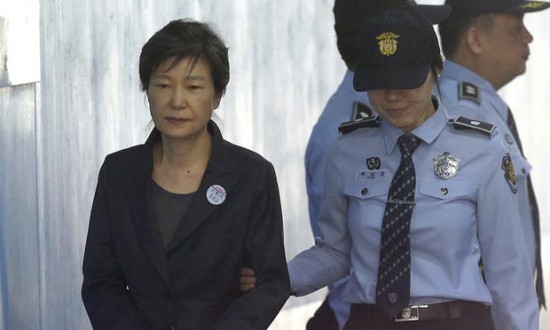Former South Korean president faces jail term in corruption case
Prosecutors have demanded a 30-year prison term for the former South Korean president Park Geun-hye for alleged bribery, abuse of power and other crimes in a landmark corruption case that marked a stunning fall from grace for the country’s first female leader and conservative icon.
Park did not attend the court hearing where prosecutors also demanded a fine of 118.5bn won (£78m) and said she had shown no remorse for “disrupting constitutional order and damaging the public’s trust in state power”. The court was expected later on Tuesday to set the date when it will announce the verdict and sentence if it finds her guilty.
“A stern punishment by the court is needed to send a message to the public and politicians that the tragic history should not be repeated,” the prosecutor, Han Dong-hoon, told the court, according to reports.
If the court finds her guilty, Park would be the third South Korean president convicted of crimes. The others were former military generals involved in a 1979 coup and a 1980 civilian massacre.
Park has been boycotting the hearings in Seoul central district court since October in protest of its decision to extend her detention by a further six months. Park’s lawyers then resigned en masse and she has reportedly been refusing to meet with state-appointed lawyers who have since been defending her in court.
Park will be required to attend her sentencing – the court can issue another arrest warrant to summon her if she refuses. If she is convicted, her defence team is expected to appeal as Park has continuously denied wrongdoing.
Park was formally removed from office and arrested in March last year amid allegations that she colluded with a longtime friend to take tens of millions of dollars from companies in bribes and through extortion. The court sentenced Park’s friend, Choi Soon-sil, to 20 years in prison earlier this month, and more severe punishment was expected for Park.
The South Korean president, Moon Jae-in, who took office last May, has said he will not use his powers to pardon Park.
Former cabinet ministers, senior presidential aides and business executives have been charged in the scandal. The chairman of the Lotte Group, Shin Dong-bin, was sentenced to two-and-a-half years in prison for offering more than £4.3m in payments to foundations controlled by Choi in exchange for business favours. The Samsung scion Lee Jae-yong was initially sentenced to five years in prison for offering bribes, but some of his convictions were overturned on appeal and the sentence was suspended.
In jail, Park reportedly has seen only a few visitors and her lawyers. Before she began boycotting the hearings, Park sat mostly expressionless in court, sometimes burying her face into the desk.
It is hard to imagine a more absolute fall for Park, who won the 2012 presidential election by more than 1m votes. She enjoyed overwhelming support from conservatives who remember her father, staunch anti-communist dictator Park Chung-hee, as a hero whose aggressive industrial policies lifted the nation from the devastation of the 1950-53 Korean war and rescued millions from poverty. Critics see the elder Park as a brutal dictator who tortured and executed dissidents.
As president, the younger Park was criticised for what opponents saw as her refusal to tolerate dissent and her alleged mishandling of a 2014 ferry disaster that killed more than 300 people, mostly schoolchildren. After she was removed from office, voters elected the first liberal national government in a decade.
27 February 2018
Disclaimer: All views, opinions and accounts included in the RAI News Section are those of the authors; their inclusion does not imply official endorsement or acceptance by RAI. The News Section reflects the selection of topics of informative value to the organization and its stakeholders. Its content is taken from press/media sources and does not in any way reflect official RAI Secretariat policy. RAI Secretariat is not responsible for possible inaccuracies in media reports.

